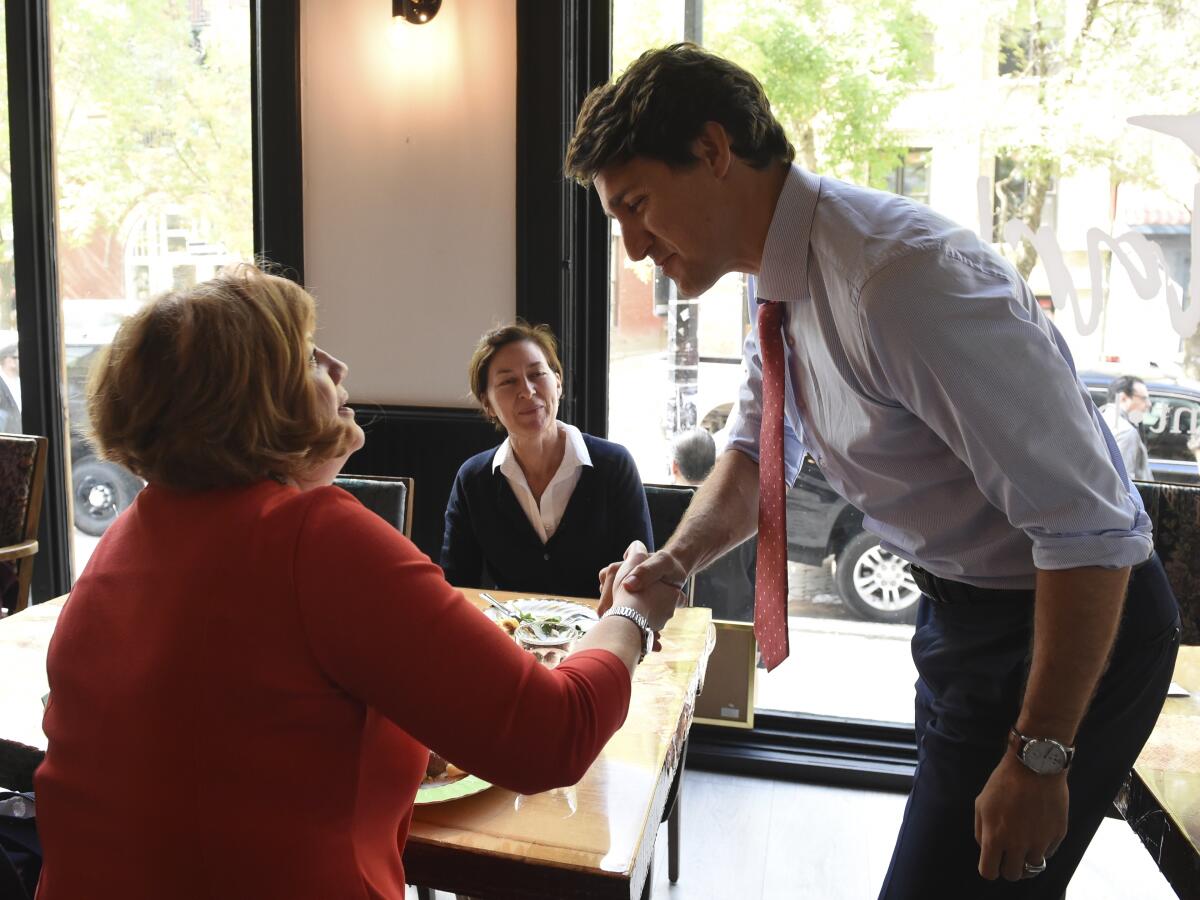As goes Winnipeg, so may go Justin Trudeau’s political fate

- Share via
WINNIPEG, Canada — The battle to control Canada has come to Beaufort Crescent, where on a brisk Saturday morning homeowners are sweeping up the early-autumn leaf drop and mowing the lawn ahead of the season’s first frost.
It is here — in what is viewed as among Canada’s most evenly divided parliamentary districts — that first-term Liberal Parliament member Terry Duguid interrupts Monica Heinrichs’ garden work to discuss climate change. It is here — in a subdivision in the southern part of Manitoba’s lone metropolitan area — that Duguid tells Winnipeg resident Peter Chan that he’ll soon be receiving a Chinese-language political brochure. And it is in places like this — where Duguid sprints from house to house, giving fresh context to the notion of running for office — that the destiny of Liberal Prime Minister Justin Trudeau will be determined in Canada’s Oct. 21 federal election.
This parliamentary district, or legislative ‘riding’ as it is referred to here, is a mix of many of the raw ingredients of Canada’s diverse population: one part urban, one part suburban, with a large student population attached to the University of Manitoba, a Chinese community where the storefronts are labeled in Mandarin, a strong Protestant presence and a sprinkling of Catholic churches — “a microcosm of English-speaking Canada,” in the phrase of Christopher Adams, pollster-turned-rector of St. Paul’s College here, populated by “people who drive pickups, people doing well, people over their heads financially.”
And in this district an hour’s drive from North Dakota, formally known as Winnipeg South, the Liberal incumbent is facing a strong challenge from his Conservative rival, Melanie Maher, who has held staff positions with the mayor of Winnipeg and the Manitoba provincial legislature and who is as eager to pin Trudeau to her rival as Duguid is to claim Trudeau’s mantle and link her to Conservative Andrew Scheer, Trudeau’s principal challenger.
Manitoba is a central prairie province where seven parliamentary seats are held by Liberals, five by Conservatives and two by the social-democratic New Democratic Party, known as the NDP. That reflects the distribution of seats across Canada, with Conservative ones generally in rural regions and Liberal ones in urban areas.
“If the Liberals lose Winnipeg South,” said Malcolm Bird, a University of Winnipeg political scientist, “it is a bad omen for the party in other places in the country.”
Other districts — one on faraway Cape Breton Island, for example, another in Brampton just outside Toronto, a third in the Millwoods section of Edmonton — also are regarded as bellwethers of the two parties’ health and their prospects. But none is more central, more hard-fought and more uncertain in this year’s 41-day election sprint than this one, a bit like a Canadian version of Ohio, where the victor of the presidential vote has won the national election all but twice since 1896.
“This is fundamentally a battle between the progressive and conservative visions for Canada,” said Curtis Brown, a partner in Probe Research, a Winnipeg nonpartisan polling company. “It’s not as ratcheted up as it is in the States, but the Liberals want to emphasize the environment and social programs, and the Conservatives are emphasizing affordability issues, how much money each family has at the end of the day and the fiscal performance of the government.”
That is why Duguid is playing to his strength, emphasizing his background in ecology — he has a bachelor’s degree in biology and a master’s in environmental science — and hoping that voters remember that party strategists in Ottawa made special efforts to elevate his profile on those issues, assuring that he was photographed at government announcements to clean up Lake Manitoba and Lake Winnipeg — two large lakes where Winnipeggers of even modest incomes repair to cottage country on the weekends and during summer holidays.
And that is why Maher’s appearances and handbills emphasize “making life more affordable so Canadians can get ahead, not just get by.”
In federal Canadian elections, and especially here in Winnipeg, voters weigh three factors before they make their selections:the character and performance of the party leader who, if he gains a parliamentary majority, would become prime minister; the identity of the local candidate who, if elected, becomes their representative on Parliament Hill; and the brand of the federal party.
Those factors basically produce a wash here.
As elsewhere, the political fairy dust has dissipated for Trudeau, whose appearances many years ago in blackface and brownface have undermined his appeal, giving the Conservatives — and especially Maher — an unforeseen opening in Manitoba, where late last month he made his most ardent apology, and around the country. This gives a unforeseen advantage to Maher. Indeed, in the St. Vital section of the district, an advertisement on a bus shelter has a picture of the prime minister together with Duguid, urges residents to “Vote Out Terry Duguid” and proclaims, “Send Trudeau a Message.”
Duguid has a strong local record — he was a Winnipeg city councilor, held prominent transport and conservation positions, and won attention for his role as a national director of an institute to control the spread of infectious diseases — and so has an advantage for being well-known and respected.
“Duguid is not your ordinary backbencher,” said Paul Thomas, professor emeritus of political science at the University of Manitoba and a prominent local analyst, “but if Trudeau’s popularity drops, he’s hurt.”
Though party brand might ordinarily be the deciding element, neither party has a discernible advantage here, for the district has bounced between Conservative and Liberal over the last two decades. Conservative Rod Bruinooge took the seat from the Liberal incumbent 13 years ago by a mere 111 votes and kept it in the next election with a victory margin of 8,544 votes. Duguid’s triumph in 2015, by 11,387 votes, flipped the seat back to the Liberals.
Last month, Manitobans gave the incumbent provincial Conservative party and Premier Brian Pallister another term amid the bronze bison statues in the massive Manitoba Legislative Building, promising spending cuts and the elimination of positions in public utilities and school boards.
With the Conservatives maintaining power in provincial politics, and with Trudeau under siege nationally, the Liberals clearly are on the defensive here, though they maintain hopes of seizing Manitoba’s two NDP seats to compensate for nearly certain losses in Atlantic Canada and farther west. And they have to hold the suburbs.
“These are the people who are going to determine the election,” said Bird, the University of Winnipeg political scientist. “This riding is filled with soccer moms and lots of ‘New Canadians’ — multicultural, visible minorities from Asia and Africa. The election is going to be won and lost in Winnipeg South and [districts like it] around the country.”
Shribman is a special correspondent.
More to Read
Sign up for Essential California
The most important California stories and recommendations in your inbox every morning.
You may occasionally receive promotional content from the Los Angeles Times.













